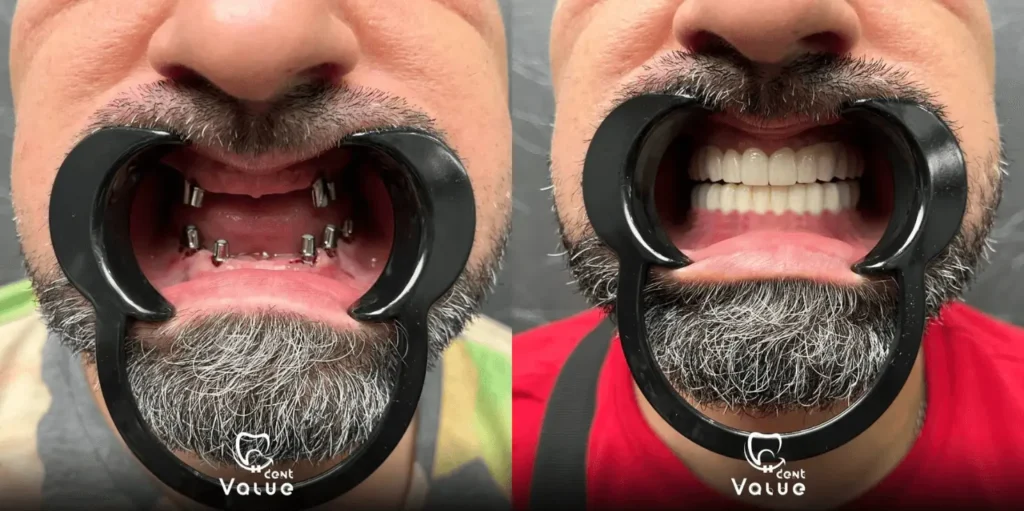
Are you struggling with multiple missing teeth or loose dentures? At Valuedent Clinic, we provide a natural-looking solution to improve your smile. Our service is Full Mouth Dental Implants, offering a comprehensive approach to understanding full mouth dental implants cost.
Full mouth dental implants are not just a dental solution; they are a transformative experience. Patients often express a newfound confidence in their daily lives. Many report feeling more comfortable in social situations, less afraid to smile, and enjoying food without worry. For individuals with multiple missing teeth or struggling with the discomfort of dentures, this procedure can significantly enhance quality of life.
This treatment can help restore your confidence. Our clinic is in the heart of Istanbul. We are a top choice for high-quality implant dentistry. We offer personalized treatment plans, including All-on-4 Istanbul and All-on-6 Istanbul procedures.
Learn more about our offerings at our dedicated page:
👉 Full Mouth Implants in Istanbul – Valuedent Clinic
💰 How Much Do Full Mouth Implants Cost in Istanbul?
The pricing for full mouth dental implants can vary significantly based on factors such as the materials used, the complexity of the case, and the specific techniques employed. At Valuedent Clinic, we prioritize transparency and clarity in our pricing structure, ensuring that you understand all costs involved before proceeding with treatment.
It’s important to note that while the cost in Istanbul is notably lower, this does not mean a compromise on quality. Many patients travel to Istanbul for dental procedures, attracted by the combination of affordability and high standards of care provided by clinics. Istanbul has become a hub for dental tourism, with patients from around the globe seeking top-notch dental care.
Understanding the full mouth dental implants cost is essential for effective planning. We provide transparent pricing details to help you make informed decisions.
The cost of full mouth dental implants in Istanbul is significantly more affordable than in the USA or Europe, without compromising on quality.
- All-on-4 Implants Istanbul: Starting from $4,500 per arch
- All-on-6 Implants Istanbul: Starting from $5,500 per arch
- Full mouth restoration (upper + lower): Starting from $8,500
All our packages are inclusive of:
Our packages also include a comprehensive consultation to discuss your dental history and expectations. This is a critical first step in ensuring that the treatment plan we create is tailored to your specific needs and desires.
- 3D dental scans and smile design
- Implant surgery with premium brands
- Temporary prosthesis and final zirconium or porcelain prosthetics
- Post-op medications
- VIP airport transfers & accommodation options (optional)
Explore more:
👉 Full Mouth Dental Implants in Istanbul – Procedure & Cost
🦷 What Makes Valuedent Clinic Different?
✔ Expert Implantologists
Our skilled team of oral surgeons and prosthodontists has completed many successful full arch restorations. We use the All on 4 and All on 6 methods.
✔ Digital Smile Design
We use advanced 3D imaging and CAD/CAM technology to create perfectly fitted, natural-looking teeth for each patient.
✔ Premium Materials
Only the best — Straumann, Nobel Biocare, and MIS implant systems are used for long-term success and biocompatibility.
✔ Patient-Centered Approach
Our commitment to patient satisfaction extends beyond the procedure itself. We ensure all follow-up care is thorough and addresses any concerns that may arise post-surgery. Our team is always available for questions or additional support, and we believe in building long-term relationships with our patients.
Every treatment plan is fully tailored, ensuring comfort, aesthetic perfection, and functionality.
✅ Benefits of Full Mouth Implants
- Permanent solution — no more adhesives or removables
- Restores chewing ability and speech
- Prevents bone loss and preserves facial structure
- Looks and feels like real teeth
- Increases self-esteem and quality of life
If you want a cost-effective option, try All-on-4 Istanbul. If you need more support and durability, choose All-on-6 Istanbul. Valuedent Clinic provides complete care at every step.
Full mouth implants also offer a chance to explore new dietary options. Patients often find that they can enjoy a wider range of foods after their procedure, including harder, crunchier items that may have been difficult to eat prior to treatment. This newfound freedom contributes to a more enjoyable lifestyle.
🔄 All-on-4 vs. All-on-6 – Which One is Right for You?
| Feature | All-on-4 | All-on-6 |
|---|---|---|
| Number of Implants | 4 per arch | 6 per arch |
| Support Level | Moderate | Maximum stability |
| Bone Requirement | Moderate bone density | Higher bone density |
| Best For | Most patients | Those with higher chewing demands |
📌 Want to know which is best for you? Visit our detailed guide on
👉 Full Mouth Implants Istanbul – Valuedent Clinic
📅 Book Your Free Online Consultation
Our international patient coordinators are ready to assist you with treatment plans, travel arrangements, and more. Let us help you rediscover your smile with a safe and affordable full-mouth implant procedure in Istanbul.
👉 Schedule your consultation today
When considering All-on-4 vs. All-on-6 implants, it’s essential to evaluate your individual needs. Each option has its own benefits and possible downsides. That is why we encourage patients to talk in detail with our specialists. This helps ensure they make the best choice for their unique situation.
During your free online consultation, we will explain the full mouth implant process in detail. This will help you make informed decisions. This session is a chance for you to ask any questions about recovery, maintenance, and the results of your treatment.



